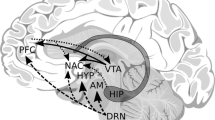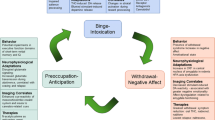Abstract
Rationale
In smokers, nicotine deprivation may increase impulsive decision-making and the demand for cigarettes.
Objectives
To investigate the effects of acute nicotine deprivation on (a) the delay discounting of monetary and cigarette rewards, and (b) the behavioural economics of hypothetical cigarette purchases.
Materials and methods
A repeated measures design was employed, with participants (daily cigarette smokers, N=30) repeating experimental tasks in two different sessions, once after at least 13 h of abstinence from smoking and once after ad lib smoking. Participants completed measures of cigarette craving, impulsivity, delay discounting and a behavioural economic simulation in which participants made hypothetical purchases of cigarettes and other commodities as the price of cigarettes was systematically varied.
Results
Participants showed more pronounced delay discounting of both cigarette and monetary rewards after abstinence compared to after ad lib smoking. In the behavioural economic simulation, nicotine deprivation had no influence on hypothetical cigarette purchases. However, spending on some commodities (alcohol, clothing, household goods, leisure activities and long-distance travel) was reduced as the price of cigarettes increased in order to fund increased spending on cigarettes, although the number of packs of cigarettes purchased actually decreased.
Conclusions
Nicotine deprivation increases impulsive choices for both cigarette and monetary rewards in a delay-discounting task. Results from a behavioural economic simulation suggest that increases in the price of cigarettes may increase smokers’ spending on cigarettes, while also reducing the number of cigarettes purchased.


Similar content being viewed by others
Notes
Participants completed identical versions of the gambling task in both experimental sessions. Results indicated that participants always performed better during the second session compared to the first, regardless of whether participants completed the abstinent or non-abstinent session first. Given the highly significant practice effects that were observed, the task may not be suitable for use in experiments that employ repeated measures designs, such as the present study. Results are not shown.
References
Baker F, Johnson MW, Bickel WK (2003) Delay discounting in current and never-before cigarette smokers: similarities and differences across commodity, sign, and magnitude. J Abnorm Psychol 112:382–392
Bechara A, Damasio AR, Damasio H, Anderson SW (1994) Insensitivity to frontal cortex following damage to human prefrontal cortex. Cognition 50:7–15
Bickel WK, Marsch LA (2001) Towards a behavioral economic understanding of drug dependence: delay discounting processes. Addiction 96:73–86
Bickel WK, Odum AL, Madden GJ (1999) Impulsivity and cigarette smoking: delay discounting in current, never, and ex-smokers. Psychopharmacology (Berl) 146:447–454
Cardinal RN, Pennicott DR, Sugathapala CL, Robbins TW, Everitt BJ (2001) Impulsive choice induced in rats by lesions of the nucleus accumbens core. Science 292:2499–2501
Cardinal RN, Winstanley CA, Robbins TW, Everitt BJ (2004) Limbic corticostriatal systems and delayed reinforcement. Ann N Y Acad Sci 1021:33–50
Cox LS, Christen AG, Tiffany ST (2001) Evaluation of the brief questionnaire of smoking urges (QSU-brief) in laboratory and clinical settings. Nicotine Tob Res 3:7–16
Denk F, Walton ME, Jennings KA, Sharp T, Rushworth MFS, Bannerman DM (2005) Differential involvement of serotonin and dopamine systems in cost-benefit decisions about delay and effort. Psychopharmacology (Berl) 179:587–596
Giordano LA, Bickel WK, Loewenstein G, Jacobs EA, Marsch L, Badger GJ (2002) Mild opioid deprivation increases the degree that opioid-dependent outpatients discount delayed heroin and money. Psychopharmacology (Berl) 163:174–182
Harris GC, Aston-Jones G (1994) Involvement of D2 dopamine receptors in the nucleus accumbens in the opiate withdrawal syndrome. Nature 371:155–157
Heatherton TF, Koslowski LT, Frecker RC, Fagerstrom KO (1991) The Fagerstrom test for nicotine dependence: a revision of the Fagerstrom tolerance questionnaire. Br J Addict 86:1119–1127
Hildebrand BE, Nomikos GG, Hertel P, Schilstrom B, Svensson TH (1998) Reduced dopamine output in the nucleus accumbens but not in the medial prefrontal cortex in rats displaying a mecamylamine-precipitated nicotine withdrawal syndrome. Brain Res 779:214–225
Hinson JM, Jameson TL, Whitney P (2003) Impulsive decision making and working memory. J Exp Psychol Learn Mem Cogn 29:298–306
Jentsch JD, Taylor JR (1999) Impulsivity resulting from frontostriatal dysfunction in drug abuse: implications for the control of behavior by reward-related stimuli. Psychopharmacology (Berl) 146:373–390
Kirby KN, Petry NM, Bickel WK (1999) Heroin addicts discount delayed rewards at higher rates than non-drug using controls. J Exp Psychol Gen 128:78–87
Madden GJ, Bickel WK (1999) Abstinence and price effects on demand for cigarettes: a behavioral-economic analysis. Addiction 94:577–588
Madden GJ, Petry NM, Badger GJ, Bickel WM (1997) Impulsive and self-control choices in opioid-dependent patients and non-drug-using control participants: drug and monetary rewards. Exp Clin Psychopharmacol 5:256–262
Madden GJ, Begotka A, Raiff BR, Kastern L (2003) Delay discounting of real and hypothetical rewards. Exp Clin Psychopharmacol 11:139–145
Madden GJ, Raiff BR, Lagorio CH, Begotka A, Mueller A, Hehli D, Wegener A (2004) Delay discounting of potentially real and hypothetical rewards. Part II: between- and within-subject comparisons. Exp Clin Psychopharmacol 12:251–261
Mitchell SH (1999) Measures of impulsivity in cigarette smokers and nonsmokers. Psychopharmacology (Berl) 146:455–464
Mitchell SH (2004) Effects of short-term nicotine deprivation on decision-making: delay, uncertainty, and effort discounting. Nicotine Tob Res 6:819–828
Myerson J, Green L, Warusawitharana M (2001) Area under the curve as a measure of discounting. J Exp Anal Behav 76:235–243
Odum AL, Rainaud CP (2003) Discounting of delayed hypothetical money, alcohol, and food. Behav Processes 64:305–313
Petry NM (2000) Effects of increasing income on polydrug use: a comparison of heroin, cocaine, and alcohol abusers. Addiction 95:705–717
Rachlin H, Brown J, Cross D (2000) Discounting in judgments of delay and probability. J Behav Decis Mak 13:145–159
Sayette MA, Hufford MR (1994) Effects of cue exposure and deprivation on cognitive resources in smokers. J Abnorm Psychol 103:812–818
Sumnall HR, Tyler E, Wagstaff GF, Cole JC (2004) A behavioural economic analysis of alcohol, cocaine, amphetamine, and ecstasy purchases by polysubstance misusers. Drug Alcohol Depend 76:93–99
Vuchinich RE, Heather N (2003) Choice, behavioural economics, and addiction. Permagon, Oxford
Vuchinich RE, Simpson CA (1998) Hyperbolic temporal discounting in social drinkers and problem drinkers. Exp Clin Psychopharmacol 6:292–305
Whiteside SP, Lynam DR (2001) The five factor model and impulsivity: using a structural model of personality to understand impulsivity. Pers Individ Differ 30:669–689
Acknowledgement
This research was funded by a research development fund from the University of Liverpool, awarded to the first author.
Author information
Authors and Affiliations
Corresponding author
Rights and permissions
About this article
Cite this article
Field, M., Santarcangelo, M., Sumnall, H. et al. Delay discounting and the behavioural economics of cigarette purchases in smokers: the effects of nicotine deprivation. Psychopharmacology 186, 255–263 (2006). https://doi.org/10.1007/s00213-006-0385-4
Received:
Accepted:
Published:
Issue Date:
DOI: https://doi.org/10.1007/s00213-006-0385-4




